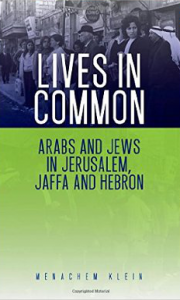
This is another in a series of reviews of new books on Middle Eastern affairs. We asked Dr. Gail Weigl, an APN
volunteer and a professor of art history, to review Menachem Klein's new book on the history of relations between
Jews and Arabs in Jerusalem, Jaffa and Hebron.
Menachem Klein, Lives in Common: Arabs and Jews in Jerusalem, Jaffa, and Hebron (Oxford, 2014), 290 pages. $30.00.
Menachem Klein’s Lives in Common is an extremely important, extremely difficult book. Important because it
painstakingly charts the history of the state of Israel from the dream to the implementation of a concerted
campaign to erase features of a defeated culture, which was an integral part of Israel’s birth. Difficult because
the author’s penchant for amassing data in support of his arguments often renders the narrative overly complex and
tedious. Nevertheless, this is a valuable book for anyone who loves or is concerned about Israel. It is a
clear-eyed account of the breakdown of relations between Jewish and Arab inhabitants of what once was a Palestine
in which the two communities lived as one.
After providing the overarching narrative, supported by both primary and secondary records and voices, Klein
himself at the end of his “Epilogue” offers at best the tepid wish that interaction between “equal human beings”
can “enable co-existence between nations and enable them to cope with past wounds.” (290) The “Epilogue”
itself is useful for understanding the thematic shape of Lives in Common, and reading the “Epilogue” first
might help the reader to grasp the outline of this often unwieldy account, its complexity perhaps a metaphor for
the many-stranded threads of the conflict itself.
 Rabbi Esther L. Lederman is the associate rabbi of Temple Micah, in Washington, DC. She
travelled to Israel this December.
Rabbi Esther L. Lederman is the associate rabbi of Temple Micah, in Washington, DC. She
travelled to Israel this December.
